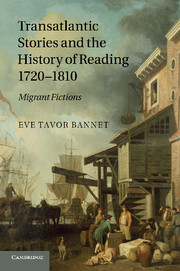Book contents
- Frontmatter
- Contents
- List of illustration
- Acknowledgments
- Introduction: Transatlantic stories and Transatlantic readers
- PART I “POOR MAN'S COUNTRY”
- PART II THE SERVANT'S TALE
- PART III PRINTSCAPES
- 8 Robert Bell's theaters of war: the war on politeness
- 9 Robert Bell's theaters of war: the war upon war
- Afterword
- Notes
- Works cited
- Index
8 - Robert Bell's theaters of war: the war on politeness
Published online by Cambridge University Press: 05 July 2011
- Frontmatter
- Contents
- List of illustration
- Acknowledgments
- Introduction: Transatlantic stories and Transatlantic readers
- PART I “POOR MAN'S COUNTRY”
- PART II THE SERVANT'S TALE
- PART III PRINTSCAPES
- 8 Robert Bell's theaters of war: the war on politeness
- 9 Robert Bell's theaters of war: the war upon war
- Afterword
- Notes
- Works cited
- Index
Summary
Bell produced a particularly interesting topical cluster in 1778, the year the British abandoned Philadelphia after a season of gallantry, balls and assemblies in which many prominent Philadelphians had eagerly joined with the occupying army. Under the title Miscellanies for Sentimentalists, Bell assembled a variety of works, which he also published singly, that reflected upon polite English manners and upon European political conduct from the vantage point of the skeptical Enlightenment: The Life of David Hume, Written by Himself; Principles of Politeness and Knowledge of the World by the late Lord Chesterfield; Political Maxims of the Cardinal de Retz; Rochefoucault's Maxims and Moral Reflections and James Murray's Travels of the Imagination. As if to remind readers of what they should be about, Bell concluded this compilation with American Philip Freneau's poem, American Independence, an Everlasting Deliverance, and with The Humble Confession, Declaration, Recantation and Apology of Benjamin Towne, Scottish-American John Witherspoon's satirical piece about a printer who had changed sides with changes in the political climate. As we will see, in an era when compilation was still considered and read as a form of writing, this was more than a random collection of mismatched texts. As we will see too, Bell's reprints of Pratt's The Pupil of Pleasure (1778) and of Mackenzie's Man of the World (1782) were among the literary reprints that belonged to Bell's skeptical reexamination of polite European manners.
- Type
- Chapter
- Information
- Transatlantic Stories and the History of Reading, 1720–1810Migrant Fictions, pp. 191 - 209Publisher: Cambridge University PressPrint publication year: 2011



